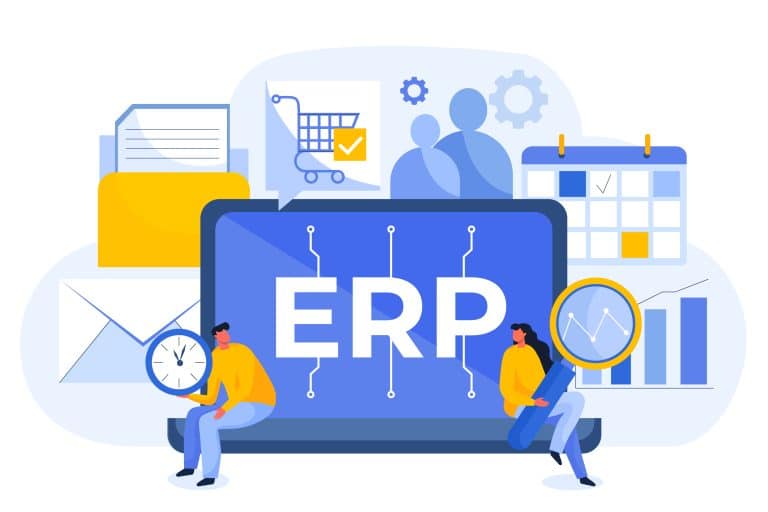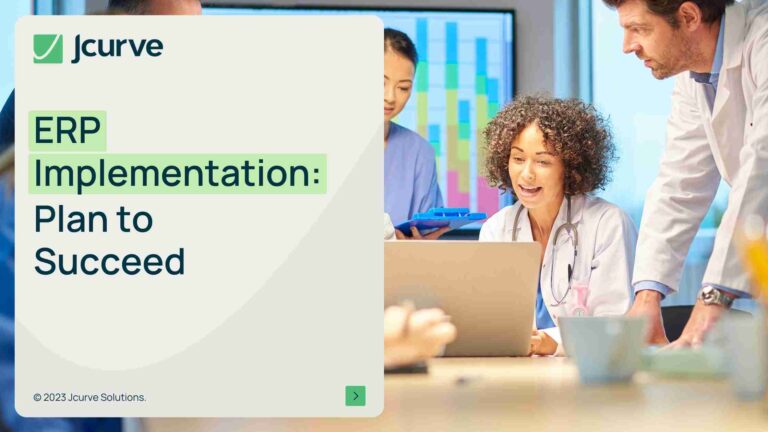Enterprise Resource Planning (ERP) systems are revolutionary tools for any business looking to enhance its financial processes and overall efficiency.
According to a study, 67% of CIOs report a positive ROI after implementing an ERP system, showcasing tangible benefits such as increased efficiency, cost savings, and improved customer service. The global ERP software market is projected to reach 100.7 billion USD by 2025, with SAP and Oracle as two of the leading vendors.
With the right ERP system, such as an Oracle NetSuite ERP, companies can experience a complete transformation in how they handle their financial operations, leading to significant improvements in productivity, compliance, and financial planning. This article explores the key ways in which an ERP system can transform your financial processes.
1. Real-Time Financial Reporting and Analysis

ERP systems enhance decision-making by offering real-time financial reporting and analysis, enabling businesses to act quickly on emerging trends and opportunities. They provide immediate visibility into financial performance, facilitating rapid responses to market changes. Additionally, ERP’s in-depth financial analysis improves understanding of financial health, aiding informed decision-making and optimising financial workflows.
Financial Control
ERP systems provide comprehensive financial control by integrating data across critical areas such as accounts receivable, accounts payable, debts, investments, bills, and miscellaneous expenses.
Budgeting and Forecasting
ERP also enhances budgeting and forecasting by offering a centralised platform to closely monitor expenses, revenues, and make necessary adjustments for accurate, realistic budgets. This holistic financial management empowers organisations to optimise their operations, ensure compliance, and drive strategic growth.
Streamlined financial operations
ERP systems enhance financial management by centralising operations and automating tasks like budgeting and reporting, thereby increasing efficiency and accuracy. They also support data-driven decision-making with real-time, detailed analysis and reporting on key metrics, providing insights for strategic activities and improving competitiveness. This integrated approach streamlines operations, minimises errors, and transforms financial data into actionable intelligence, facilitating informed decisions in a dynamic market environment.
Financial Statements & Finance Modules
Financial modules within ERP systems automate the creation of financial statements, providing an accurate reflection of business health and facilitating compliance with financial reporting requirements. By integrating accounting, payroll, and other financial data, ERP systems generate comprehensive financial reports, such as balance sheets, income statements, and cash flow statements, with minimal manual intervention.
Cash Management & Cash Flow Statement
ERP’s cash management features help businesses manage their cash flow more effectively, as evidenced by detailed cash flow statements. These systems track and analyse incoming and outgoing cash, enabling organisations to forecast their liquidity, manage payments and receivables, and optimise their use of working capital.

2. Supply Chain Management
ERP integrates supply chain management, improving visibility and efficiency across supply chains, leading to optimised operations and cost savings. By connecting procurement, inventory, and logistics data within a unified platform, businesses gain end-to-end supply chain insights. This enables them to better manage supplier relationships, optimise inventory levels, and streamline transportation—all of which contribute to improved profitability.
3. Customer Relationship Management
ERP plays a crucial role in enhancing customer relationship management by providing detailed insights into customer interactions, improving service, and driving sales. With a centralised view of customer data, businesses can better understand customer needs, tailor their offerings, and deliver a superior customer experience. This, in turn, fosters customer loyalty and drives revenue growth.
4. Inventory Management
ERP systems streamline inventory management, ensuring accurate tracking and management of stock levels to meet customer demand without overstocking. Real-time inventory data, combined with demand forecasting capabilities, allows companies to optimise inventory levels, reduce carrying costs, and minimise the risk of stockouts or excess inventory.
5. Business Performance
ERP systems’ data analytics capabilities enhance business performance monitoring, enabling companies to track progress against goals. By consolidating data from across the organisation, ERP solutions provide a holistic view of business performance, allowing executives to identify areas for improvement, measure the impact of strategic initiatives, and make informed decisions to drive growth.
6. Human Resources
ERP systems encompass human resources management, aiding in optimising staffing levels and enhancing workforce productivity towards better operational efficiency. From recruitment and onboarding to payroll and employee development, ERP integrates HR functions, enabling businesses to better align their human capital with overall organisational objectives.
7. Operational Efficiency
ERP systems are linked to improved operational efficiency through automated processes and integrated data across departments. By streamlining workflows, eliminating redundant tasks, and providing a centralised repository of information, ERP solutions help organisations optimise their business processes, reduce costs and enhance productivity.
8. Strategic Decisions
The data gathered and analysed by ERP systems is critical in making strategic decisions that affect the company’s direction and growth. Real-time insights into financial performance, market trends, and operational metrics empower executives to identify opportunities, mitigate risks, and develop well-informed strategies to propel the business forward.
9. Profit Margins
ERP systems contribute to improving profit margins by reducing operational costs and enhancing productivity. By automating processes, optimising resource utilisation, and providing visibility into financial and operational data, ERP solutions help businesses identify and address inefficiencies, ultimately boosting their bottom line.
10. Reporting & Compliance Requirements
ERP systems ensure businesses meet financial regulations by integrating auditing, data security and compliance automation. This approach fosters risk management of any data breaches and penalties while providing precise financial data for regulatory requirements, positioning ERPs as indispensable for financial management.
11. Reduce Financial Errors
ERP systems significantly minimise financial errors by centralising and automating financial tasks—reducing manual data entry and duplication risks. Through automation of invoice and payment processing, the chance of making manual mistakes reduces. Real-time reporting enables swift identification and correction of errors, ensuring financial statements remain accurate and compliant, thereby avoiding financial discrepancies and penalties.
12. Scalability for Growth
As businesses grow, their financial processes and systems must scale accordingly. ERP systems are inherently scalable, designed to accommodate the changing needs of a growing business. Whether it’s expanding into new markets or adding new services, an ERP system can adapt quickly, ensuring that financial operations continue to run smoothly.
Furthermore, ERP systems tailor to the unique trajectory and sector of your business, offering scalable financial processes and the flexibility to address the specific demands of varied industries efficiently.
Take Control of your Finances Today with Jcurve

Adopting an ERP system like NetSuite can profoundly impact your financial processes, leading to greater efficiency, accuracy, and strategic insight. By choosing a solution that aligns with your business needs, you can ensure a successful transformation of your financial operations. For more information on how ERP systems can benefit the future growth of your business, explore our consulting service.
There are many ways an ERP can transform your financial process, and to integrate it, please contact Jcurve.
Related Posts
Financial Management Systems and How Do They Differ from ERP?ERP systems provide a comprehensive solution to enhance and streamline financial processes across all areas of your business. For insights on how ERP systems compare to Financial Management Systems (FMS) and guidance on choosing the right solution for your needs, consider exploring further through our article “Financial Management Systems and How Do They Differ from ERP?”










